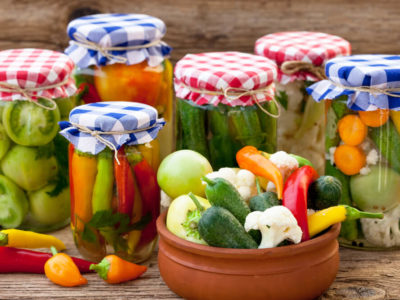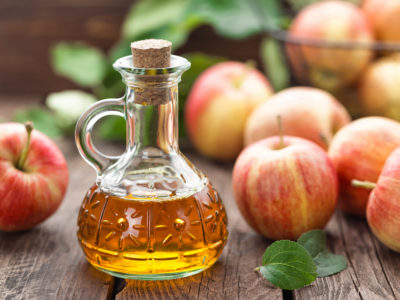Table of Contents[Hide][Show]
- What Is a Microbiome Diet?
Start Your Microbiome Diet with These Amazing Foods+−
- 1. Sauerkraut
- 2. Kefir
- 3. Yogurt
- 4. Apple Cider Vinegar
- Apple Cider Vinegar: Immune System Boost or Bust?
- 5. Almonds
- 6. Lentils
- 7. Gluten-Free Food
- 8. Miso
- 9. Fiber-Rich Foods
- Prebiotics for a Healthy Gut… and a Healthy You!
- 10. Salmon
- 11. Kimchi
- 12. Kombucha
- Probiotic Tea: Everything You Need to Know
- Genius Foods – 7 Superfoods For Brain Health
- The Best Time to Take Probiotics (Food & Supplements)
What Is a Microbiome Diet?
Before answering this question, let’s first start with a refresher of what a microbiome is. The central location of the human microbiome is in the gut, which contains trillions of microbes.
Some of the microorganisms or bacteria that comprise the intestinal microbiota are beneficial (probiotics) and some are harmful (pathogens) to overall health and wellness.
By keeping your gut microbiota balanced through a supportive microbiome diet and other measures—like smart supplementation—you can keep the bad bacteria in check and avoid or even reverse health problems such as dysbiosis, leaky gut, Crohn’s disease, IBS, ulcerative colitis, and other gastrointestinal issues.
If you want to optimize your health, bio hack your body, prevent and heal chronic disease, and know which foods are right for you—almost all of this can be achieved via your gut microbiome.
With all of that being said, let’s get back to the initial question:
Typically this involves the consumption of foods that are:
- organic,
- fermented,
- packed with natural probiotics and prebiotics,
- anti-inflammatory,
- whole foods (especially fruits and vegetables),
- and rich in dietary fiber.
A microbiome diet also thrives when certain foods—especially common in Western diets—are eliminated or greatly reduced. These include:
- processed foods
- artificial sweeteners, colors, and other additives
- simple carbohydrates
- gluten
- alcohol & caffeine
5 Diet Tips For a Healthy Microbiome
There are a number of things you can do to favorably alter your microbiome composition. Besides reducing stress level, making sleep a priority, and getting more exercise, consider the following dietary changes. Consult your primary doctor, dietitian, or other qualified healthcare provider for additional guidance.
Eat more fiber.
Hunter and gatherer societies eat over 100 grams of fiber per day. The average American eats less than 15 grams per day.
Make some swaps for high-fiber foods like legumes, avocado, and raspberries. Add chia seeds and ground flax seeds to your food and psyllium husks to smoothies. Start slow as “bulking up” too fast can make things worse. Avoid non-food fiber products.
Avoid inflammatory foods.
Conventional dairy, gluten, soy and sugar can really aggravate your digestive system. Consider taking them out for a couple weeks and slowly trying one at a time to see which foods aggravate your gut. If there are other foods you suspect might be a problem for you, take them out at the same time.
Reduce intake of alcohol and caffeine.
These can also be taken out while you trial inflammatory foods, or you can trial them on their own. At the very least, try to keep your coffee intake to one or two cups per day, with no sugar or dairy creamer added. If you drink alcohol on a regular basis, cut that back as well.
Keep hydrated.
Many of us walk around dehydrated not realizing it. Simply drinking enough water (and avoiding dehydrating beverages like alcohol and caffeine) can be enough to get a person’s bowel movements regular.
The rule of thumb is you should drink half your body weight in ounces per day. For example, a 150 pound person would have a daily water intake of 75 ounces. This is especially important as you increase your fiber intake.
Try fermented foods.
Fermented foods have been through lacto-fermentation, where bacteria turn sugar into lactic acid. Fermentation preserves the food, creates beneficial enzymes and vitamins and makes food more digestible. Studies show probiotics in fermented foods are beneficial to our mental health because they increase bioavailability of mood-regulating B vitamins, magnesium and zinc. Fermentation also helps your immune system by increasing omega-3 fatty acids, lactase and other powerful players that fight off harmful bacteria.
Try fresh sauerkraut (see our easy, DIY recipe here or from the refrigerated section), kimchi, or kefir. Start slow, as some people with digestive issues can either have symptoms increase at first, or have a histamine reaction to the fermentation.
Related
Improve Your Health With Fermented Food
Learn more about the benefits of fermented foods, some do’s and don’ts, and what some of the most popular fermented foods are.
Start Your Microbiome Diet with These Amazing Foods
To promote a balanced gut flora, try to incorporate these foods into your microbiome diet. Not only could you reduce any digestive upset you may be experiencing, but eating more of the right foods can promote other beneficial effects such as weight loss/decreased obesity risk, lower cholesterol, more energy, improved mood and mental clarity, reduced diabetes risk (by improving insulin sensitivity and fasting blood glucose), and even decreased risk of cardiovascular issues and cancer.
1. Sauerkraut
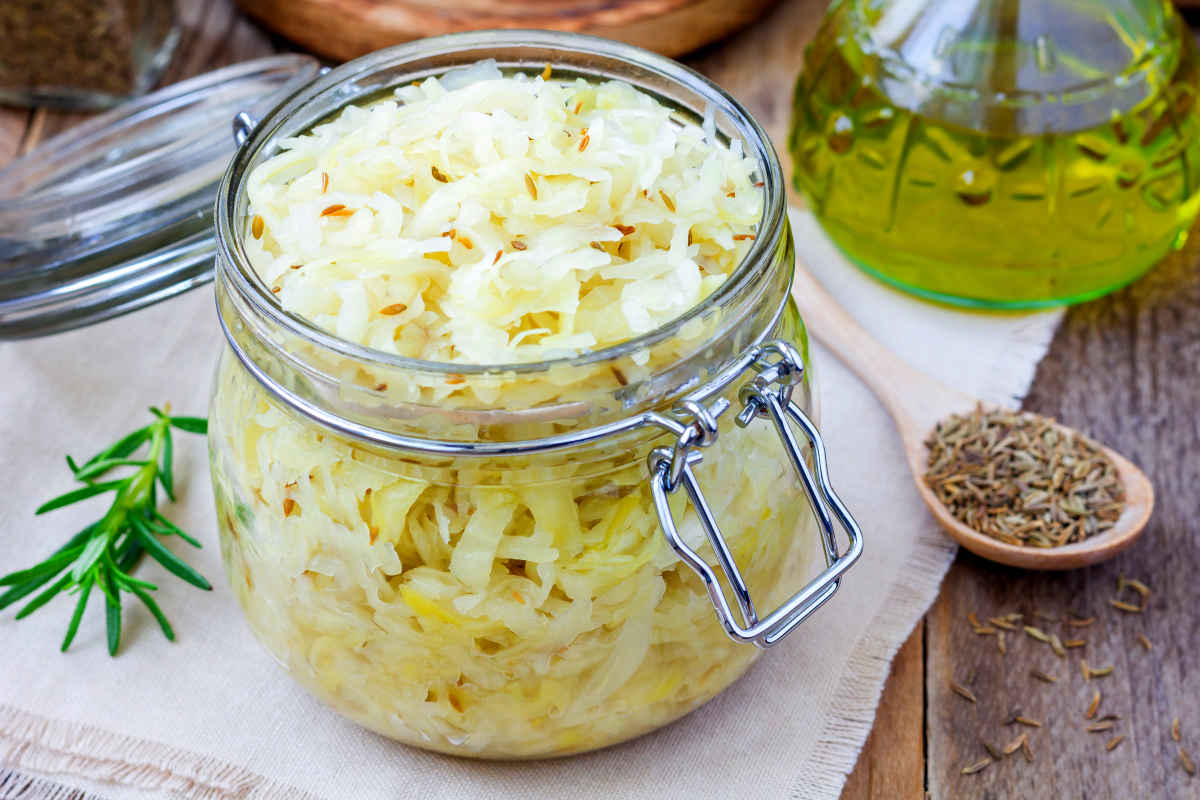
One of the best foods for your microbiome diet is sauerkraut. This pickled cabbage appetizer and topping provides probiotics through the process of fermentation.
Sauerkraut is also one of a few foods that contain Lactobacillus bacteria, especially Lactobacilli plantarum. L. plantarum can live in your gut and prevent pathogenic disease-causing microorganisms from flourishing.
Probiotics provide the body with many other health benefits as well. For example, it can help restore the balance of gut bacteria after taking antibiotics.
2. Kefir
Kefir is typically made from fermented cow’s or goat’s milk using kefir grains. These are not actually grains but a colony of yeast and bacteria.
When kefir combines with milk, the bacteria helps break down the sugars and ferment the milk in the process. Once the process is complete, you can remove the grains and use them again.
That’s not the only beauty of kefir, though. It has more than 50 strains of yeasts and bacteria.
Diversity is essential since the goal in the microbiome diet is to maintain balance among the microorganisms.
3. Yogurt
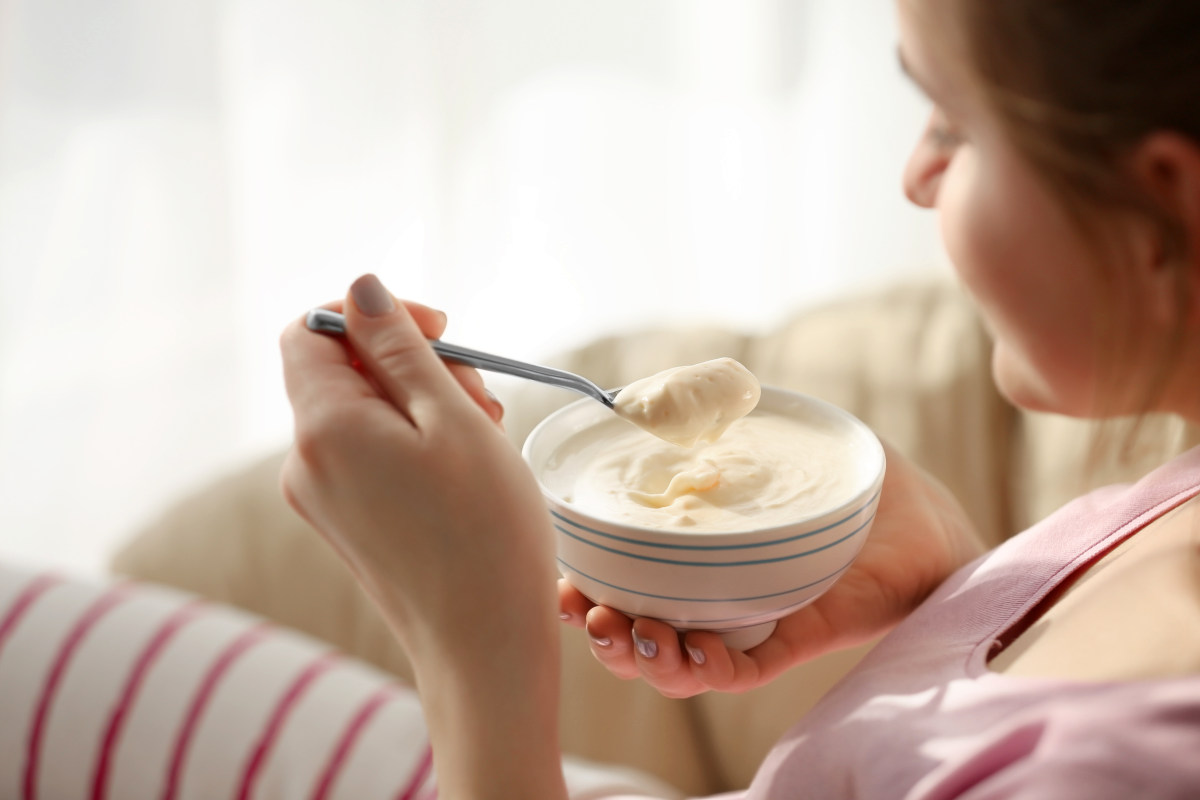
A microbiome diet meal plan will never be complete without yogurt. It’s an awesome alternative to kefir, which can have a very strong sour taste.
Yogurt can help relieve a person with irritable bowel syndrome (IBS). It is a condition affecting the large intestine and characterized by changes in bowel movement and bloating.
In an experiment, those who consumed fermented milk yogurt with Bifidobacterium animalis experienced decreased symptoms of bloating. It also boosted the frequency of bowel movements for those who only poop less than three times a week.
4. Apple Cider Vinegar
Contrary to popular belief, apple cider vinegar (ACV) is not a probiotic, but it’s still worth adding to the microbiome diet because it improves the gut colony.
ACV is rich in pectin, which is a prebiotic since it is the indigestible fiber of the fruit. In an animal study, it can increase the production of butyrate, a short-chain fatty acid (SCFA) which feeds gut bacteria.
At the same time, it helps maintain the balance since it can also attract toxins and pathogens, thereby removing them from the intestines.
Related
Apple Cider Vinegar: Immune System Boost or Bust?
Learn more about apple cider vinegar immune system benefits and whether you should add it into your overall wellness plan.
5. Almonds
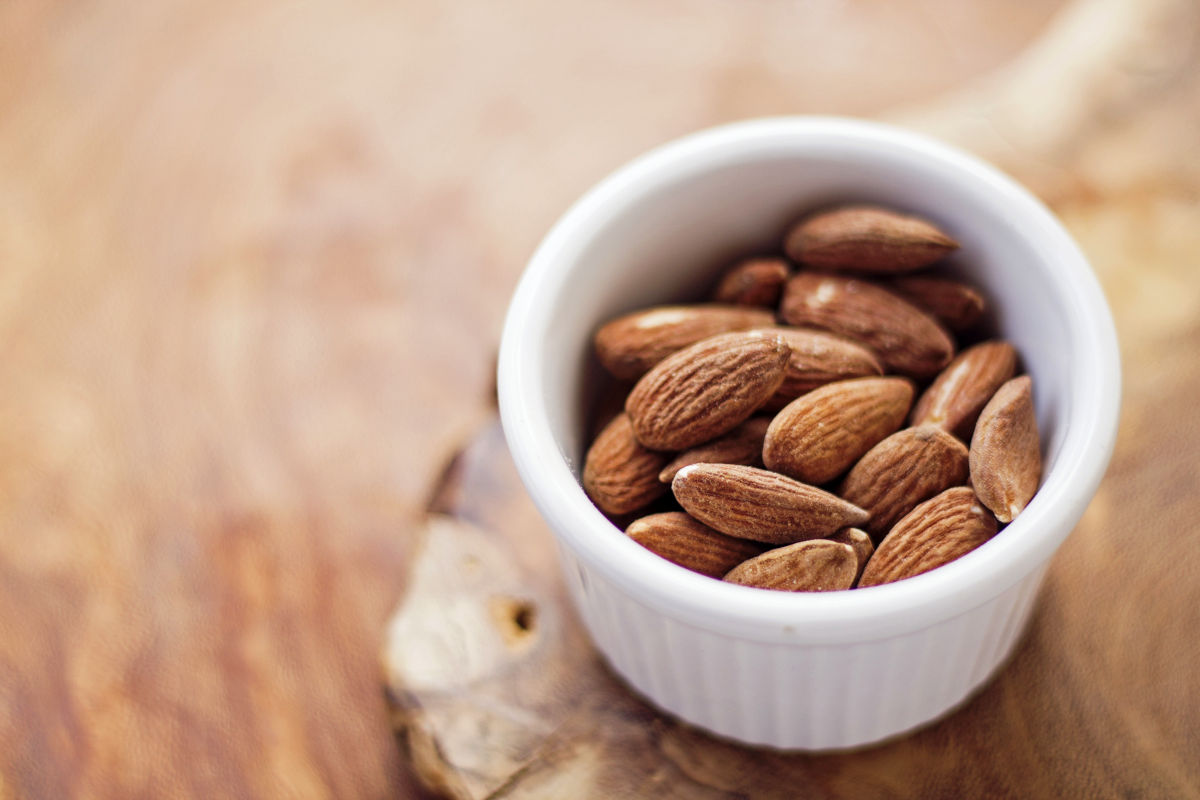
Almonds, like a lot of nuts, are excellent sources of fat. You can eat them to help fill your tummy in between meals.
What you may not know is it can also be good for your gut microbiome diet. These nuts have prebiotic properties.
The finely ground ones may also increase the population of certain probiotics such as Bifidobacteria compared to commercial prebiotics.
6. Lentils
Lentils are legumes that deserve to be part of your microbiome diet for one reason: it contains both soluble and insoluble fiber.
The soluble fiber helps feed the gut bacteria, allowing the good ones to multiply. The insoluble component works as a cleaner, absorbing excess water and toxins.
In an animal study, rats fed with a lentil diet experienced a decrease of pathogenic species in their poop. Even better, it is rich in protein and other nutrients.
That’s why it’s a well-known meat substitute for those who want to be vegan or vegetarian.
7. Gluten-Free Food

Gluten is a controversial subject as some experts say not everyone needs to follow a gluten-free diet. It is a must only for those with celiac disease, an autoimmune condition wherein the gluten protein triggers intestinal symptoms such as severe abdominal pain and bloating.
Some people, though, may not have celiac disease but may exhibit gluten intolerance or sensitivity. In this case, they can benefit from a microbiome diet plan without it.
8. Miso
If you like to live as long as the Japanese, then you may want to include miso in your microbiome diet food list.
Miso is a condiment made from fermented soybean, salt, and a fungus known as Aspergillus oryzae. In some cases, it may be with grains such as rice, quinoa, malt, and barley.
Besides providing the dish with the umami (savory) taste, the fungus and the fermentation process adds probiotics to the condiment.
The procedure may also decrease the anti-nutrient effect of the ingredients. It means your body can maximize the absorption of the nutrients.
9. Fiber-Rich Foods
What’s a microbiome diet without eating fiber-rich foods? The question is, how do they exactly contribute to your gut health?
These types of food (prebiotics) do more than feeding the millions of bacteria in the gut. Changes in the amount of fiber you eat can also affect the diversity of the microbiome.
For example, in one of the animal studies, the scientists learned a lack of prebiotics encourages rare microorganisms to become common while the popular ones are decreased.
As a result, the mice experienced physiological changes in their gut. Their small intestines shrank while the intestinal walls thinned.
It brought the bacteria much closer to the wall, which can then trigger an immune reaction. It may also increase the possibility of a leaky gut.
To boost fiber-rich foods in your diet, try adding:
- Onions
- Leeks
- Garlic
- Chicory root
- Dandelion greens
- Jicama root
- Jerusalem artichokes
- Asparagus
- Legumes (chickpeas, beans)
Related
Prebiotics for a Healthy Gut… and a Healthy You!
Heard about prebiotics but don’t know exactly what they are and what they do in the body? Here’s what you need to know about them, why they are essential to gut health, and how you can easily add them into your daily health regimen.
10. Salmon
Salmon is a delicious, protein-rich, nutrient-packed food that can also be perfect for maintaining gut health due to omega-3 fatty acids.
In a recent UK study, the researchers learned those who had high levels of omega-3 also possessed a more diverse gut microbiome.
The team believed it’s because the fatty acids stimulate the microorganisms to produce N-carbamylglutamate (NCG). It is a compound that can potentially decrease oxidative stress, based on animal models.
11. Kimchi
Kimchi is a side dish and staple of Korean cuisine, consisting of salted, fermented vegetables, usually cabbage and radish with seasonings. These can include ginger, garlic, red chilli flakes, and scallions. The taste is often described as sour, tangy, acidic, salty, spicy, and pungent.
It is low in sugar and fat, as well as abundant in essential amino acids, and because it’s a fermented food like many others on this list, it’s an excellent addition to a microbiome diet.
If you are a sauerkraut fan and love spicy foods, why not give kimchi a try? You can make kimchi yourself at home or buy it pre-made at your local grocery store.
12. Kombucha
Kombucha is a popular fermented beverage. This superfood tea has been consumed for thousands of years and can help with gut health, your immune system, and so much more.
Kombucha is a live-cultured vinegary, sour, and sweet tea that’s often bubbly. It’s made from tea, cane sugar (organic is best when possible), and SCOBY (symbiotic culture of bacteria and yeast).
Kombucha is packed with vitamins and antioxidants, aids digestion, promotes an alkaline pH (reduces inflammation), and even supports better immune, joint, and brain health.
Closing Thoughts
Diet and microbiome will always go hand in hand.
By maintaining a healthy microbiome diet, you can keep your gut microbes happy and, in the process, improve your immunity and decrease the risks of many diseases.
You May Also Like…
Editor’s Note: This post was originally published on May 31, 2019, and has been updated for quality and relevancy on September 9, 2021.

